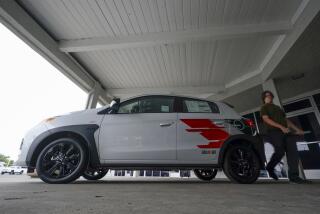August Surge in Purchases Puts Dent in Inventory : Suzuki Expecting a Decline in Samurai Sales
- Share via
DETROIT — Despite August’s rebate-induced surge, sales of the controversial Suzuki Samurai are likely to slump once again, Suzuki officials acknowledged here Wednesday.
Company officials blame the coming relapse on supply problems caused by August’s record sales and said sales for the rest of 1988 will fall below the lowest levels hit amid the Samurai roll-over controversy earlier in the summer.
Officials said, however, they still don’t see any permanent damage from the recent controversy over safety.
Suzuki sold a record 12,208 Samurais in August, when the Japanese auto maker was offering $2,000 discounts in an effort to lure customers scared away by publicity surrounding the roll-over allegations. That incentive program, which ended Sept. 2, cost about $30 million, the company says.
Samurai sales had plummeted in June and July in the wake of a study by Consumer Reports magazine that found that the truck’s center of gravity was too high and was thus prone to roll over. In a New York press conference in June, officials of Consumers Union, publisher of Consumer Reports, said the Samurai was dangerously unsafe and should be recalled and even called for the truck to be taken off the streets and its owners reimbursed by Suzuki.
Suzuki officials responded with an aggressive public relations campaign and the massive sales incentive program, which seemed to turn the tide that was then running against the Samurai.
The federal government also announced that it would not act to order the vehicle off the road for safety reasons. When August’s sales figures were released earlier this month, Suzuki had proclaimed an end to the Samurai roll-over controversy.
On Wednesday, Suzuki officials acknowledged that they expect sales to plunge to just 2,000 a month for the remainder of 1988, below June’s sales of 2,199, the lowest sales month on record for Samurai. For all of 1988, Suzuki executives believe that sales will fall to 80,000 units, down slightly from 1987’s 83,000.
“We simply don’t have the inventory” to maintain a higher sales pace, said Laura Segall, a Suzuki spokeswoman.
Suzuki will introduce its 1989 model Samurai in January, but company executives wouldn’t make any sales projections for next year for the vehicle.
Instead, they wanted to concentrate on the prospects for the other new cars and trucks they introduced here Wednesday. Those include a larger, higher priced utility vehicle, the Sidekick, and the subcompact Swift, the auto maker’s first passenger car to be sold in the United States.
Both the Swift and Sidekick will be imported from Japan until next April, when Suzuki’s joint venture with General Motors will begin production of both models in a new Canadian plant.
GM will offer both vehicles as well under its new Geo import nameplate. The GM version of the Sidekick is called the Geo Tracker, while its version of the Swift will be the Geo Metro. GM, which has a minority stake in Suzuki, will get the lion’s share of the Canadian plant’s output; Suzuki’s American sales operations will receive just 17.5% of the cars and trucks produced there, Suzuki officials said.
More to Read
Inside the business of entertainment
The Wide Shot brings you news, analysis and insights on everything from streaming wars to production — and what it all means for the future.
You may occasionally receive promotional content from the Los Angeles Times.








